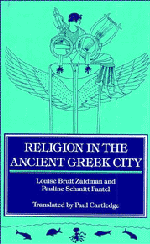Book contents
- Frontmatter
- Contents
- List of illustrations
- Author's preface to the English translation
- Translator's introduction
- List of sources
- PART I Introduction: How should we study Greek civic religion?
- PART II Cult-practices
- PART III Systems for representing the divine
- PART IV Envoi
- 15 Concluding reflections
- Appendixes
- Bibliography
- Index
15 - Concluding reflections
Published online by Cambridge University Press: 05 June 2012
- Frontmatter
- Contents
- List of illustrations
- Author's preface to the English translation
- Translator's introduction
- List of sources
- PART I Introduction: How should we study Greek civic religion?
- PART II Cult-practices
- PART III Systems for representing the divine
- PART IV Envoi
- 15 Concluding reflections
- Appendixes
- Bibliography
- Index
Summary
A QUESTION OF PSUKHĒ
Throughout this book we have tried to show that the religion of the Greeks was ‘other’, desperately foreign; that it had its own peculiar categories and frames of reference; and that it has to be defined in relation to the values of the Greek city, within the context of which its structures had overriding significance. We have observed, too, that the beliefs of the Greeks, like those of each and every culture-group, were a function of the psychological categories which organized their perception of the world.
We have stressed that, in the process of analysing the Greeks' religious concepts, misinterpretation may arise through confusing their categories with our own. For example, there has been a tendency to privilege those aspects of Greek religion which appear to betoken a piety that is allegedly ‘superior’ because closer to the values of Christianity. This has led to the practices of sects like the Pythagoreans and Orphics being interpreted as if they heralded a new conception of the divine. In the same inappropriate spirit, mystery-cults and initiations have often been misconstrued according to the model of soteriological religious and misrepresented, therefore, as preparations for an afterlife implying beliefs which in reality have nothing to do with the civic religion of the Greek city. To us, in our effort to understand the Greeks' religion, it has seemed more interesting to relate all these practices to other contemporary ones, to which they formed a response, and with which they comprised a coherent whole.
- Type
- Chapter
- Information
- Religion in the Ancient Greek City , pp. 231 - 234Publisher: Cambridge University PressPrint publication year: 1992

